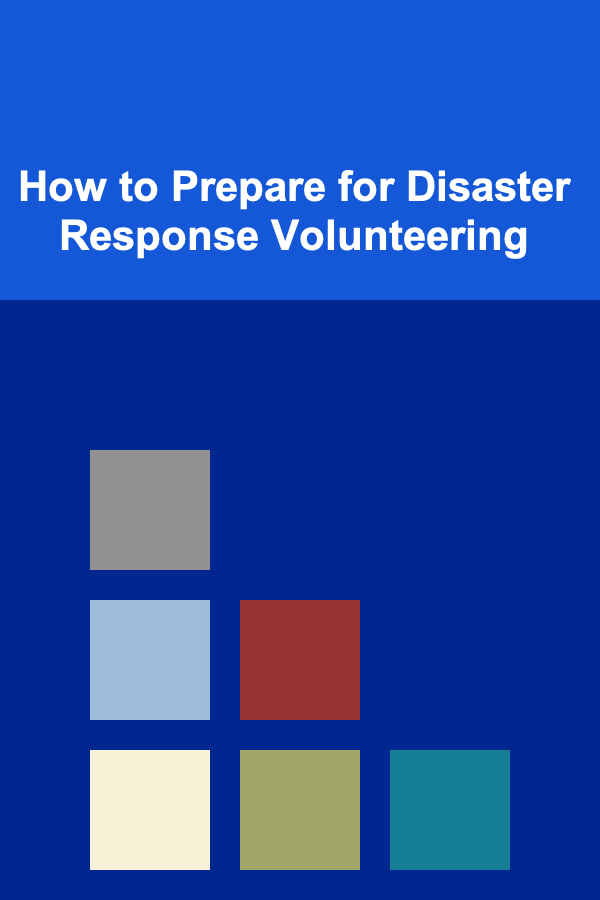
How to Prepare for Disaster Response Volunteering
ebook include PDF & Audio bundle (Micro Guide)
$12.99$8.99
Limited Time Offer! Order within the next:

Disaster response volunteering is an act of bravery, compassion, and selflessness. Whether it's a natural disaster, like an earthquake or hurricane, or a humanitarian crisis, the need for volunteers in times of distress is immense. Volunteers play an essential role in delivering emergency aid, providing emotional support, and assisting with recovery and rebuilding efforts. However, preparing for disaster response volunteering requires a thoughtful and proactive approach. Volunteers need to be physically, mentally, and emotionally prepared for the challenges they may face.
This comprehensive guide will explore the key steps you need to take to adequately prepare for disaster response volunteering. From understanding the role of a volunteer to acquiring the necessary skills and training, we'll walk through everything you need to know to ensure that you're ready to make a meaningful impact during a disaster.
Understand the Role of a Disaster Response Volunteer
Before you begin your preparation, it's crucial to have a clear understanding of what being a disaster response volunteer entails. Volunteers are often on the front lines of disaster relief efforts, offering support in a variety of ways. These can include:
- Rescue Operations: Assisting first responders in search and rescue operations.
- Logistical Support: Helping to distribute food, water, clothing, and medical supplies to affected populations.
- Psychosocial Support: Offering emotional and psychological aid to survivors who are dealing with trauma and loss.
- Community Assistance: Helping with the cleanup, rebuilding, and recovery of communities after the disaster.
- Information Dissemination: Sharing vital information with affected individuals about resources, safety measures, and evacuation procedures.
Your specific role will depend on the disaster type, the organization you're volunteering with, and your experience level. Understanding these responsibilities will help you mentally prepare for the demanding work ahead.
Assess Your Personal Motivation and Readiness
Volunteering in disaster response requires a deep sense of commitment and empathy. It's not just about helping out during times of crisis---it's about staying strong in challenging environments and remaining focused despite adversity. As you prepare to volunteer, reflect on your personal motivations and assess whether you have the mental and emotional readiness for such work.
Self-Reflection:
- Why do you want to volunteer in disaster response?
- Are you prepared to witness distressing scenes and work in a high-pressure environment?
- How do you handle stress and emotional discomfort?
The answers to these questions will give you a deeper insight into your motivations and whether you're emotionally ready for the tough challenges ahead. Disaster response can be incredibly fulfilling, but it also comes with significant emotional and mental strain, so it's important to be fully aware of your readiness.
Gain Relevant Training and Skills
While anyone with a willingness to help can volunteer, certain skills can make you a more effective and valuable asset during disaster response efforts. Many organizations offer specialized training programs for disaster volunteers, and acquiring these skills will not only boost your confidence but also increase your ability to assist effectively.
Key Skills to Develop:
a. Basic First Aid and CPR
Disaster response often involves helping injured individuals, and knowing basic first aid and CPR can be life-saving. Many organizations require volunteers to have these skills before deploying to disaster zones. Take courses to learn how to handle injuries, perform CPR, and provide basic medical assistance.
b. Disaster Management Training
Disaster management courses will give you a comprehensive understanding of how disaster relief operations are organized and managed. These courses will teach you about coordination, logistical planning, risk management, and how to work within a team. Knowledge of disaster management will prepare you for unexpected challenges and help you understand the importance of clear communication and organization during disaster response.
c. Psychological First Aid
In addition to physical care, providing emotional and psychological support is equally important during disaster response. Psychological First Aid (PFA) helps individuals cope with the emotional aftermath of trauma. Learning PFA techniques can help you provide comfort, guidance, and support to survivors, easing their emotional burden and guiding them through recovery.
d. Cultural Sensitivity and Communication
When volunteering in international disaster zones, cultural awareness is essential. Understanding the cultural context of the affected communities will allow you to communicate effectively, avoid misunderstandings, and respect local customs. Language barriers may also exist, so learning key phrases in the local language or using translation tools can be extremely helpful.
e. Search and Rescue Techniques
For volunteers involved in rescue operations, learning search and rescue (SAR) techniques is essential. While many search-and-rescue operations are led by trained professionals, volunteers can play a critical role in assisting with searching, providing logistical support, or helping evacuate individuals.
f. Safety and Security Protocols
Disaster zones can often be hazardous. Volunteers should know safety protocols to protect themselves and others. This includes understanding risks such as unstable buildings, contamination, disease, and inclement weather. Be aware of local safety guidelines, and always follow the instructions of emergency managers.
Choose the Right Organization to Volunteer With
Selecting the right organization to volunteer with is a vital step in your disaster response preparation. Different organizations specialize in different areas of disaster response, so you need to choose one that aligns with your skills, interests, and the type of disaster you wish to address. Here are some factors to consider:
a. Reputation and Experience
Choose an organization with a solid track record in disaster response and a strong reputation for providing effective aid. Research the organization's past responses to disasters and evaluate their effectiveness in providing relief. This can help you avoid organizations that might not be adequately prepared or equipped to handle the complexities of a disaster.
b. Area of Expertise
Different organizations focus on different aspects of disaster response. Some specialize in providing food and shelter, while others might focus on medical care, education, or psychological support. Choose an organization that suits your skills and interests. If you're a medical professional, for example, consider volunteering with an organization that focuses on healthcare in disaster-stricken areas.
c. Volunteer Opportunities
Look for an organization that offers well-structured volunteer programs with clear expectations and responsibilities. Some organizations may require long-term commitments, while others may provide short-term assignments. Review the roles available and ensure that they align with your abilities and the amount of time you're willing to dedicate.
Prepare Your Body and Mind for Physical and Emotional Demands
Physical and emotional resilience is essential in disaster response volunteering. Depending on the disaster, you may need to work long hours, often in harsh and challenging conditions. Volunteers may need to lift heavy objects, work in extreme temperatures, or navigate hazardous environments.
Physical Preparation:
- Stay Active and Healthy: Physical endurance is essential for disaster response. Prepare by staying in good physical shape and improving your stamina. Regular exercise can help you handle the physical demands of lifting, moving, and walking long distances in difficult conditions.
- Sleep and Nutrition: Proper sleep and nutrition are crucial for maintaining energy levels during long shifts. Ensure that you are well-rested and well-nourished before volunteering.
Mental and Emotional Preparation:
- Build Resilience: Disaster zones can expose volunteers to stressful and distressing scenes. It's important to build mental resilience to cope with traumatic events. Mindfulness practices, deep-breathing exercises, and stress-management techniques can help you manage emotional stress in the field.
- Know Your Limits: It's important to recognize when you need to take a step back. Disaster response is a team effort, and no one person can do it all. If you're feeling overwhelmed or emotionally exhausted, seek support from others or take a break.
Equip Yourself with Necessary Gear and Supplies
Disaster zones often lack basic amenities, so volunteers need to come prepared with the necessary gear. What you bring will depend on the disaster situation, the duration of your stay, and the specific tasks you'll be performing. Here's a checklist of basic items to consider:
- First Aid Kit: Include bandages, antiseptic wipes, pain relievers, and any necessary medications.
- Clothing: Bring durable clothing, including work boots, gloves, and layers to handle varying weather conditions.
- Personal Hygiene Supplies: Pack essentials like soap, toilet paper, wet wipes, and hand sanitizers.
- Flashlight and Batteries: Power outages are common during disasters, so a flashlight will be essential.
- Water and Food: Ensure you have sufficient water and non-perishable snacks to sustain you during your shifts.
- Documentation: Keep any identification, medical certificates, and volunteer credentials handy.
Understand the Risks and Limitations
Disaster zones can be unpredictable, and volunteering in these environments comes with inherent risks. It's important to understand these risks before deploying.
Common Risks:
- Physical Injuries: Volunteers may face injuries from debris, unstable structures, or accidents.
- Disease and Contamination: Exposure to disease or contaminated water can pose health risks in certain environments.
- Emotional Trauma: Witnessing suffering and loss can lead to emotional stress and burnout.
While organizations will provide training and safety guidelines, you should also be aware of your limitations and take necessary precautions to protect yourself.
Plan for Post-Disaster Reflection and Recovery
After a disaster response mission, it's important to reflect on your experiences and recover emotionally. Many disaster response volunteers experience post-traumatic stress, burnout, or emotional fatigue after their deployments. Take time to decompress, seek professional counseling if needed, and connect with other volunteers for support.
Engaging in post-disaster debriefings with your volunteer organization can help you process the experience and learn from it. Reflection and emotional recovery are critical to ensure that you remain healthy and prepared for future volunteer efforts.
Conclusion
Disaster response volunteering is a powerful and meaningful way to make a difference during times of crisis. By preparing physically, mentally, and emotionally, gaining relevant skills and training, choosing the right organization, and understanding the risks, you can be ready to contribute effectively to disaster response efforts. It's not an easy job, but the rewards of helping those in need and contributing to the rebuilding of communities are immeasurable. As you embark on your volunteering journey, remember that your efforts can bring hope and resilience to those who need it most.

How to Create a Fun DIY Photo Booth for Your Party
Read More
How to Document Camp Memories with Photos and Videos
Read More
How to Set Up a Functional Laundry Room for Ease
Read More
Mastering Content Strategy: A Roadmap for the Modern Content Strategist
Read More
How to Rent Your First Apartment: A Beginner's Checklist
Read More
How to Craft Unforgettable Sci-Fi Villains
Read MoreOther Products

How to Create a Fun DIY Photo Booth for Your Party
Read More
How to Document Camp Memories with Photos and Videos
Read More
How to Set Up a Functional Laundry Room for Ease
Read More
Mastering Content Strategy: A Roadmap for the Modern Content Strategist
Read More
How to Rent Your First Apartment: A Beginner's Checklist
Read More